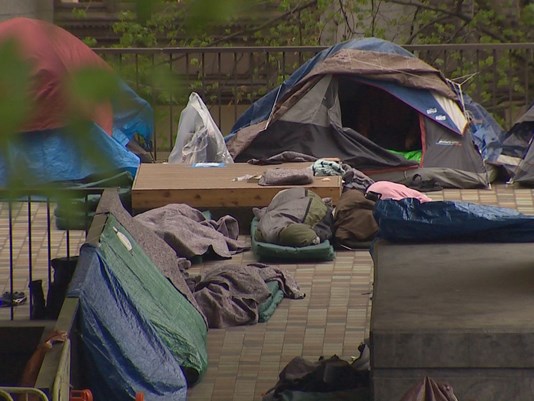News
Seattle councilmembers float business tax to address homeless crisis
Posted on

This article was published by King 5 on Oct. 12, 2017.
Seattle council members announced a proposal Thursday to address the city’s homeless crisis through a new business tax.
The backlash among Seattle’s business community was almost immediate.
Council member Mike O’Brien and Councilmember Kristen Harris-Talley said their proposal, called Housing, Outreach and Mass-Entry Shelter (H.O.M.E.S.), would address short-term needs for homeless and 24-hour shelters, along with more permanent, long-term housing.
The proposal would be funded by a business tax on large employers. The tax, which would take effect early 2018, is assessed at $0.048 (4.8 cents) per hour, per employee and would affect the top 10 percent of the highest-grossing businesses in Seattle.
They say that only businesses that gross more than $5 million a year would pay the tax.
In a statement, Harris-Talley said the following:
“It is our large employers who have benefited most from Seattle’s economic boom. As a result, big business is best positioned to help relieve some of the pressure created by rapid economic growth. We need a systemic fix to help address the resulting lack of affordable housing and dearth of places for people to go. This is a solution that protects the most vulnerable in our city and will help small businesses thrive.”
Mayor Tim Burgess’ proposed budget brings total spending on homeless services up to $63 million for 2018.
But O’Brien and Harris-Talley argue that the city’s 2018 proposed budget doesn’t meet the need of addressing homelessness, specifically 24-hour shelters, permanent housing and rental assistance.
“We can’t ignore the displacement caused by growth in Seattle,” said O’Brien. “Without more 24-hour shelter so people can come inside and new short- and long-term housing solutions, our existing system is set up to fail.”
According to a release from the city, the H.O.M.E.S. proposal would generate up to $24 million, which is equivalent to approximately $100 per employee on an annual basis.
“It’s puzzling,” said Downtown Seattle Association president Jon Scholes, when asked about his reaction to the proposal. “We no doubt have a big problem when it comes to homelessness in the City of Seattle, but if it was only about spending more money, we would’ve solved it years ago.”
Scholes says he worries about what kind of message the business tax proposal sends to large employers.
“It’s the wrong message to send to companies looking to create opportunities for people in this city to have work. And that work and those jobs create lots of tax benefits for this city,” he said. “The message it sends is if you are successful as a business, if you start here and grow, then we’re going to tax you.”
The Seattle Metropolitan Chamber of Commerce also issued a strongly worded statement.
“We need to invest our resources wisely toward solutions that work, instead of pursuing a new tax on jobs. The Council has a nearly $70 million increase in the general fund that it could use to address housing affordability. This money is in addition to last year’s $290 million Housing Levy, which the Chamber and the business community supported and helped pass, and a $29 million affordable housing bond Council added last year. This is not a resource issue. It’s a matter of political will,” said Maud Daudon, president and CEO of the Chamber of Commerce.
Meanwhile, mayoral candidate Cary Moon applauded the plan as a starting point and said she looked forward to working with the council members on the details.
“As mayor, I would ask whether a head tax is the best way to approach this – we want to encourage more family wage jobs, not fewer, and to minimize barriers for small and local businesses,” Moon said in a statement. “I would look closely at exemptions for certain small businesses. For example, while a $5 million threshold makes sense for a low-overhead professional services firm, it may not be right for a small mom and pop retailer or restaurant with high sales volume but low-profit margins.”
A campaign spokesperson for Moon’s opponent Jenny Durkan said Durkan “looks forward to reviewing the proposal and seeing how it evolves during the budget process. She will push for a more progressive tax system, which ensures that people and companies that can afford to pay more do pay more.”
“Jenny is very happy to see that the City Council is seriously considering some of the solutions she has supported or proposed, including expanding LEAD to all precincts and adding additional emergency shelter beds,” said campaign spokesperson Stephanie Formas. ” She remains hopeful they will commit to locating that shelter in every council district, as Jenny has proposed, and to adding 1,000 tiny homes as a short term solution to get people out of tents, doorways, parks and cars. In addition — many simply cannot wait for new housing to be built — so Jenny hopes the council fully funds her proposed rent voucher program to give help immediately to hundreds who need the help now. Too many are endanger of becoming homeless without immediate help.”
“Jenny looks forward to reviewing the proposal and seeing how it evolves during the budget process. She will push for a more progressive tax system, which ensures that people and companies that can afford to pay more do pay more. But she has also outlined her own detailed plans to address housing and homelessness, with specific funding sources, to supports tens of thousands of families struggling with rent payments, build micro-housing for those experiencing homelessness, and expand emergency shelters in community centers, not parks.”
Council members will be briefed on the proposal during Budget Deliberations scheduled for 10:30 a.m. on October 16.
KING 5 made repeated requests for interviews with council members O’Brien and Harris-Talley. City Hall staff said the pair would not be able to speak to KING 5 until Monday, despite talking to other members of the media Thursday morning.